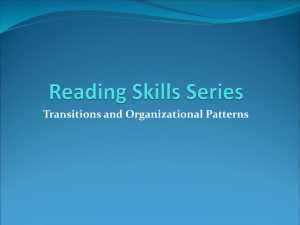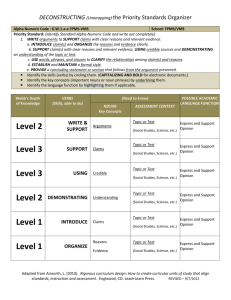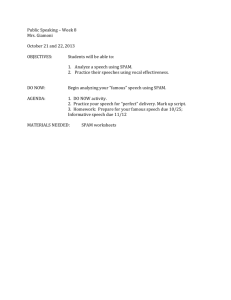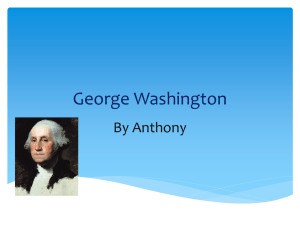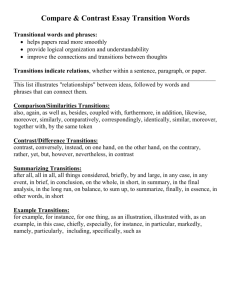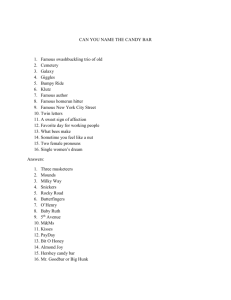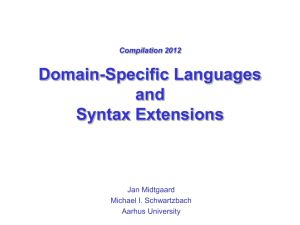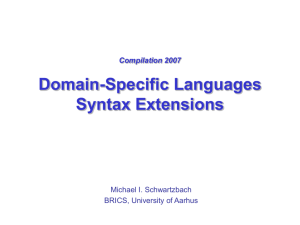Writing Standards
advertisement
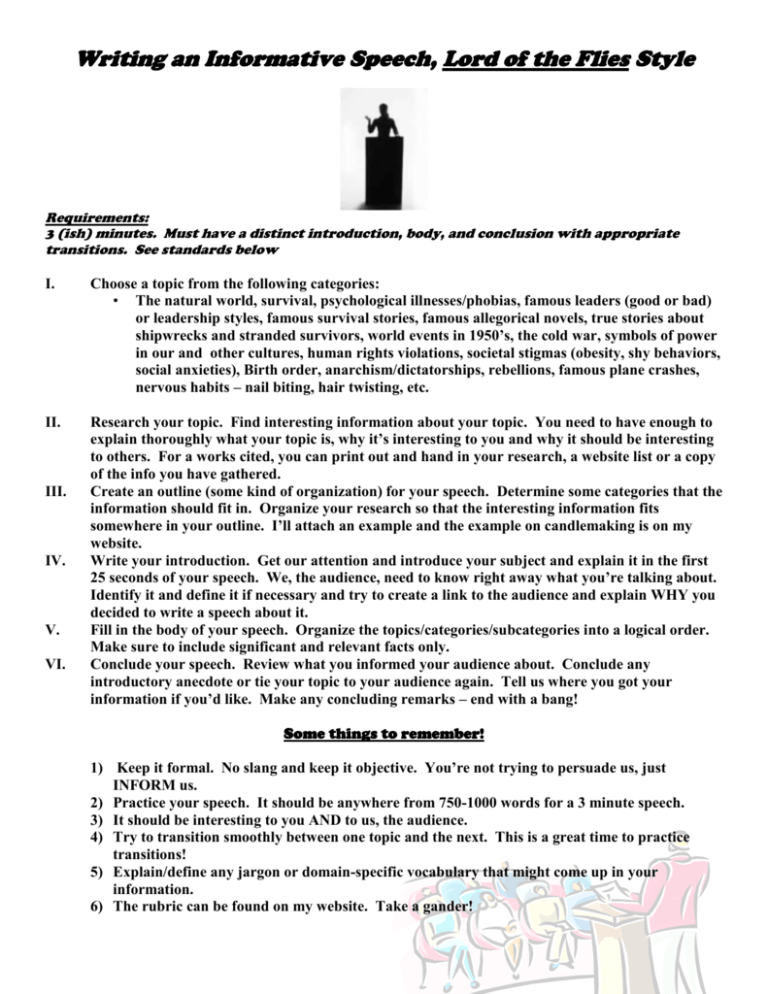
Writing an Informative Speech, Lord of the Flies Style Requirements: 3 (ish) minutes. Must have a distinct introduction, body, and conclusion with appropriate transitions. See standards below I. Choose a topic from the following categories: • The natural world, survival, psychological illnesses/phobias, famous leaders (good or bad) or leadership styles, famous survival stories, famous allegorical novels, true stories about shipwrecks and stranded survivors, world events in 1950’s, the cold war, symbols of power in our and other cultures, human rights violations, societal stigmas (obesity, shy behaviors, social anxieties), Birth order, anarchism/dictatorships, rebellions, famous plane crashes, nervous habits – nail biting, hair twisting, etc. II. Research your topic. Find interesting information about your topic. You need to have enough to explain thoroughly what your topic is, why it’s interesting to you and why it should be interesting to others. For a works cited, you can print out and hand in your research, a website list or a copy of the info you have gathered. Create an outline (some kind of organization) for your speech. Determine some categories that the information should fit in. Organize your research so that the interesting information fits somewhere in your outline. I’ll attach an example and the example on candlemaking is on my website. Write your introduction. Get our attention and introduce your subject and explain it in the first 25 seconds of your speech. We, the audience, need to know right away what you’re talking about. Identify it and define it if necessary and try to create a link to the audience and explain WHY you decided to write a speech about it. Fill in the body of your speech. Organize the topics/categories/subcategories into a logical order. Make sure to include significant and relevant facts only. Conclude your speech. Review what you informed your audience about. Conclude any introductory anecdote or tie your topic to your audience again. Tell us where you got your information if you’d like. Make any concluding remarks – end with a bang! III. IV. V. VI. Some things to remember! 1) Keep it formal. No slang and keep it objective. You’re not trying to persuade us, just INFORM us. 2) Practice your speech. It should be anywhere from 750-1000 words for a 3 minute speech. 3) It should be interesting to you AND to us, the audience. 4) Try to transition smoothly between one topic and the next. This is a great time to practice transitions! 5) Explain/define any jargon or domain-specific vocabulary that might come up in your information. 6) The rubric can be found on my website. Take a gander! Writing Standards W.11-12.2 Write informative/explanatory texts (speech) to examine and convey complex ideas, concepts, and information clearly and accurately through the effective selection, organization, and analysis of content. a. Introduce a topic; organize complex ideas, concepts, and information so that each new element builds on that which precedes it to create a unified whole; b. Develop the topic thoroughly by selecting the most significant and relevant facts, extended definitions, concrete details, quotations, or other information and examples appropriate to the audience’s knowledge of the topic. c. Use appropriate and varied transitions and syntax to link the major sections of the text, create cohesion, and clarify the relationships among complex ideas and concepts. d. Use precise language, domain-specific vocabulary, and techniques such as metaphor, simile, and analogy to manage the complexity of the topic. e. Establish and maintain a formal style and objective tone while attending to the norms and conventions of the discipline in which they are writing. f. Provide a concluding statement or section that follows from and supports the information or explanation presented (e.g., articulating implications or the significance of the topic). Production and Distribution of Writing W.11-12.4 Produce clear and coherent writing in which the development, organization, and style are appropriate to task, purpose, and audience.(Grade-specific expectations for writing types are defined in standards 1–3 above.) W.11-12.7 Conduct a short research project’s to answer a question (including a self-generated question); narrow or broaden the inquiry when appropriate; synthesize multiple sources on the subject, demonstrating understanding of the subject under investigation. Speaking and Listening Standards: SL.11-12.4 Present information, findings, and supporting evidence, conveying a clear and distinct perspective, such that listeners can follow the line of reasoning and the organization development, substance, and style are appropriate to purpose, audience, and a range of formal and informal tasks. SL.11-12.6 Adapt speech to a variety of contexts and tasks, demonstrating a command of formal English when indicated or appropriate. Writing Standards W.11-12.2 Write informative/explanatory texts (speech) to examine and convey complex ideas, concepts, and information clearly and accurately through the effective selection, organization, and analysis of content. a. Introduce a topic; organize complex ideas, concepts, and information so that each new element builds on that which precedes it to create a unified whole; b. Develop the topic thoroughly by selecting the most significant and relevant facts, extended definitions, concrete details, quotations, or other information and examples appropriate to the audience’s knowledge of the topic. c. Use appropriate and varied transitions and syntax to link the major sections of the text, create cohesion, and clarify the relationships among complex ideas and concepts. d. Use precise language, domain-specific vocabulary, and techniques such as metaphor, simile, and analogy to manage the complexity of the topic. e. Establish and maintain a formal style and objective tone while attending to the norms and conventions of the discipline in which they are writing. f. Provide a concluding statement or section that follows from and supports the information or explanation presented (e.g., articulating implications or the significance of the topic). Production and Distribution of Writing W.11-12.4 Produce clear and coherent writing in which the development, organization, and style are appropriate to task, purpose, and audience.(Grade-specific expectations for writing types are defined in standards 1–3 above.) W.11-12.7 Conduct short a research project to answer a question (including a self-generated question); narrow or broaden the inquiry when appropriate; synthesize multiple sources on the subject, demonstrating understanding of the subject under investigation. Speaking and Listening Standards: SL.11-12.4 Present information, findings, and supporting evidence, conveying a clear and distinct perspective, such that listeners can follow the line of reasoning and the organization development, substance, and style are appropriate to purpose, audience, and a range of formal and informal tasks. SL.11-12.6 Adapt speech to a variety of contexts and tasks, demonstrating a command of formal English when indicated or appropriate.
